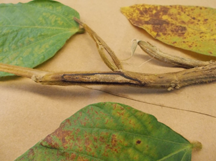The Northern New York Agricultural Development Program is inviting North Country farmers to hear the results of its latest projects at its annual meetings in eastern NNY on February 27 in Chazy. The research reports sessions begin at 1pm at Miner Institute in Chazy. Registration is not required to attend.
The Northern New York Agricultural Development Program is a farmer-driven research and technical assistance program serving all sectors of the agricultural industry, from dairy and crops to livestock, maple and horticultural production, in Clinton, Essex, Franklin, Jefferson, Lewis and St. Lawrence counties.
‘The Northern New York Agricultural Development Program is noted for producing real-world, practical results, and the 2014 project reports live up to that expectation,’ says Program Co-Chair Jon Greenwood, a dairy producer in St. Lawrence County.
‘Northern New York Agricultural Development Program small grants connect North Country farmers with faculty, researchers, and specialists with Cornell University, Cornell Cooperative Extension, the State University of New York, W.H. Miner Agricultural Research Institute, and other expertise to address critical needs and emerging opportunities,’ says NNYADP Co-Chair Joe Giroux, a Clinton County dairyman.
Reports at the meetings will cover:
. emerging corn and soybean diseases
. the identification of mastitis-causing pathogens
. corn grain variety trials under Northern New York growing conditions
. evaluating alfalfa-grass mixes for dairy and livestock forage
. production practices for the Juneberry superfruit
. health management for sheep and goats, and
. how the inexpensive biocontrol developed with long-term NNYADP funding to beat back the highly-destructive alfalfa snout beetle now holds promise for helping fruit and vegetable growers statewide.
One of the acclaimed Northern New York Agricultural Development Program successes came through long-term funding that provided the time needed for Cornell University researchers to develop an inexpensive, biocontrol treatment that is now substantially reducing the impact of the highly-destructive alfalfa snout beetle. The concept of using native nematodes that destroy the larvae of the beetle is now being applied in trials to reduce other types of pests in strawberry crops in Northern New York, in apple and grape crops elsewhere in the state, and at the Battle Island Golf Course in Fulton, NY.
As time allows, the meeting may also make note of recent NNYADP projects focused on winter forage crops production for the dairy and livestock industries; enhancing agricultural environmental stewardship through tile drainage, nutrient recycling, and on-farm water quality; adapting to climate change; enhancing market opportunities for North Country beef producers; and season extension for fruit and vegetable growers.
Complete research reports are posted on the Northern New York Agricultural Development Program website at www.nnyagdev.org. For more details on the annual meetings, call 315-376-5270.
According to the 2012 Census of Agriculture, 4,365 farms manage more than 1.1 million acres of farmland with a hired labor payroll of more than $67.2 million. Those numbers represent a gain of 97 farms, 64,487 acres, and $15 million in payroll since the 2007 Census.
Photo:
 Northern New York Agricultural Development Program Co-Chair Jon Greenwood, a St. Lawrence County dairy owner, 2nd from left, and NNYADP Coordinator Margaret E. Smith, a Cornell University professor of plant breeding and genetics, 2nd from right, welcomed legislative representatives to the 2014 annual meeting of the farmer-driven NNYADP: left to right are Brian Peck with the office NYS Assemblyman Ken Blankenbush, NYS Assemblywoman Addie J. Russell, and Michael Schenk with the office of NYS Senator Patty Ritchie.
Northern New York Agricultural Development Program Co-Chair Jon Greenwood, a St. Lawrence County dairy owner, 2nd from left, and NNYADP Coordinator Margaret E. Smith, a Cornell University professor of plant breeding and genetics, 2nd from right, welcomed legislative representatives to the 2014 annual meeting of the farmer-driven NNYADP: left to right are Brian Peck with the office NYS Assemblyman Ken Blankenbush, NYS Assemblywoman Addie J. Russell, and Michael Schenk with the office of NYS Senator Patty Ritchie.
